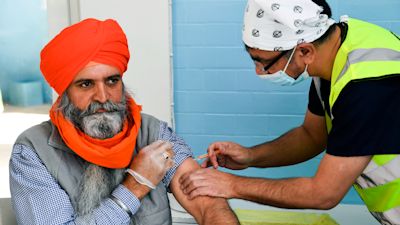Former vaccine chief returns to NHS amid concerns about rising cases and slow booster uptake

ITV News Correspondent Marc Mallett reports on why ministers remain confident that Covid jabs will get the country through winter despite advisors calling for the implementation of 'Plan B' curbs
In a possible sign of the government's concern over rising Covid cases heading into winter, the former head of England vaccine delivery drive has been drafted back into the job.
Dr Emily Lawson had been behind the original success of the rollout of the Covid-19 jabs, but was seconded to Number 10's delivery unit (a team in charge of ensuring the government delivers on its policies) in April as the rollout continued apace.
Now, however, amid stark warnings to ministers about the threat of the pandemic in the coming months, Dr Lawson has returned to the health service as it steels itself for winter.
It comes as scientific advisers told the government that it must ensure stricter Plan B restrictions to tackle coronavirus can be "rapidly" deployed if needed.
Coronavirus: What you need to know - listen now
On Saturday, a prominent adviser to the government on Covid-19 said he is “very fearful” there will be another “lockdown Christmas”, saying case numbers and death rates are currently “unacceptable".
Speaking in a personal capacity, Professor Peter Openshaw, a member of the New and Emerging Respiratory Virus Threats Advisory Group (Nervtag), told BBC Breakfast: “We know that with public health measures the time to act is immediately. There’s no point in delaying."
“If you do delay then you need to take even more stringent actions later. The immediacy of response is absolutely vital if you’re going to get things under control.
In a meeting dated October 14, Scientific Advisory Group for Emergencies (Sage) warned that measures from the government’s Plan B would have greatest effect if brought in in unison and earlier on rather than later.
However, experts on the Sage also said, in minutes of a meeting published on Friday, that a further huge spike in infections as seen in January was "increasingly unlikely".
Scientists are in favour of a relatively light-touch approach, implemented earlier to make a difference.
Sage said the "reintroduction of working-from-home guidance is likely to have the greatest individual impact on transmission out of the proposed measures" in Plan B, which also includes the mandatory use of face masks.
The group also advised that "policy work on the potential reintroduction of measures should be undertaken now so that it can be ready for rapid deployment".
It comes as Chancellor Rishi Sunak told The Times that the country could not return to "significant economic restrictions" and that the vaccine rollout meant this was not necessary.
Boris Johnson also said on Friday that another lockdown was not planned.
On a visit to a vaccination centre in west London, he was asked whether a full lockdown with "stay at home" advice and shops closing was out of the question this winter.
He replied: "I’ve got to tell you at the moment that we see absolutely nothing to indicate that that’s on the cards at all."
However, messaging urging people eligible to get the Covid booster jabs was being ramped up amid a lower enthusiasm than for the initial doses.
In a video posted on Twitter, Mr Johnson said: "This pandemic isn’t over and the danger hasn’t gone away.
"It’s just as vital to get your booster if you are called as it was to get your first and second jabs."
Meanwhile, a statement from unions representing three million people, seen by the Guardian, criticised the government’s "laissez-faire approach to managing the pandemic".
TUC general secretary Frances O’Grady told the paper: "We all want to beat Covid once and for all and to avoid further lockdowns. But without decisive action now we risk sleepwalking into another winter of chaos."
Is the rollout of Covid booster jabs going as planned?
The rollout of the first and second doses of the coronavirus vaccine across the country has been widely celebrated, however the uptake of booster vaccines has not been as swift.
The slower progress as colder months draw near could be one of the reasons for Dr Lawson being moved back to the NHS from No 10.
The ex-chairwoman of the UK vaccine taskforce Dame Kate Bingham said she feared the "great British success story" of vaccination is "at risk of stalling".
Speaking to the Daily Mail, she said: "I am genuinely worried that the great gains we have made in the last ten months risk being eroded with potentially serious consequences.
"Like everyone else, I don’t want to … go back to that anxious existence where elderly people are prisoners in their own homes, normal family life is curtailed and leisure, entertainment and sporting activities are halted.
"I don’t want Christmas on Zoom. And, most of all, I don’t want people becoming seriously ill and dying when it can be avoided."
Fewer than half of eligible residents in older age care homes in England have received a coronavirus booster jab, the latest available NHS data suggests.
And average daily hospital admissions in England of people with Covid-19 have climbed to their highest level for nearly eight months.
An estimated 5.3 million booster doses of Covid-19 vaccine have been delivered in the UK.
It means around one in nine people in the UK who have received a first and second dose of vaccine are likely to have also received a booster.